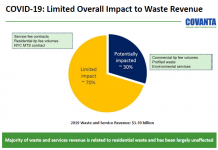The first and last word in any discussion of biofuels should always be "Feedstock." Feedstock is the "Bio" out of which biofuels will eventually be made, whether it be corn, sugar, jatropha, algae, palm oil, switchgrass, forestry waste, or municipal solid waste.
Before the era of peak oil, we lived in a world of plenty, which meant that we could squander energy, not only by driving Hummers, but by feeding energy intensive products such as corn crops to livestock, and by dumping "free" sources of energy such as garden waste and used cooking oil into landfills.
The era of cheap energy is over. The signs are all around, and even peak oil deniers point to expensive-to-extract reserves such as deep water drilling, Canadian tar sands, and even Colorado’s Oil Shale. These sources of oil are not only more expensive to extract, they are are also more carbon-intensive, meaning that regulation of greenhouse gas emissions will raise their price further.
Commodity Squeezes
In terms of biofuels, I’ve long argued that there is simply not enough feedstock available, and that even if there were enough feedstock to replace all the oil products we use today, there are many other potential uses which will compete for the output of scarce land and water, such as a replacement for coal in electrical generation, and fodder for livestock. Biodiesel producers may find that the best quality oil is bought up by refineries to make green diesel instead. In fact, it seems that almost any form of biomass can be converted to Bio-crude and processed in a conventional refinery. We’ll even have to decide if municipal waste should be recycled, burned for electricity, or turned into cellulosic ethanol.
I’m unconvinced that anyone knows exactly how the limited feedstocks we have available will be used, or what process will be most efficient in converting them into their final form. This makes it difficult to find a biofuel investment that I can be confident will succeed. One biofuel technology after another has been caught by a commodity squeeze, first corn ethanol and now biodiesel makers. Polyannaish investors expecting limitless supplies of feedstock for cellulosic ethanol should take note. Higher commodity prices do not always lead to more supply. Sometimes higher prices lead to lower demand, and the next boom could easily become the next bust.
The Sure Winner
![]() The only sure winners from limited and increasingly valuable biomass will be the people who produce it: farmers, foresters, and (perhaps) trash haulers and recyclers. What do farmers do when they have spare cash? They buy farm equipment, quite often from Deere & Co. (NYSE:DE) Few stock have ridden the biofuel boom as well as Deere, with the stock rising 400% in the last four years in a nearly uninterrupted uptrend, without the thrills and spills that have turned so many investors off of corn ethanol.
The only sure winners from limited and increasingly valuable biomass will be the people who produce it: farmers, foresters, and (perhaps) trash haulers and recyclers. What do farmers do when they have spare cash? They buy farm equipment, quite often from Deere & Co. (NYSE:DE) Few stock have ridden the biofuel boom as well as Deere, with the stock rising 400% in the last four years in a nearly uninterrupted uptrend, without the thrills and spills that have turned so many investors off of corn ethanol.
The beauty of Deere as a biofuel investment is that there is no need to know what the biomass will be used for, or what form it will come in. In nearly every scenario I can envision, Deere is likely to be a major supplier to the industry which grows it. From algae to Jatropha, if Deere does not yet sell equipment to plant, tend, and harvest it, it seems a good bet that they will design one. This technology agnosticism, combined with their wide dealer network in agricultural areas, makes the company seem to me the safest way to bet on biofuels as a trend.
Deere’s close relationship with farmers also gives them an opportunity to profit from another up-and-coming crop: Wind.
Even with a 9-year run up, the stock currently trades at a trailing P/E of 22, and despite its construction arm, has not yet been hit hard by the turbulence in the housing market. Since I expect the housing situation to only get worse over the coming months, a sharp decline in construction income or a continued broad market decline may be just what prospective investors need to pick up this solid biofuel play on the cheap.
Click here for other articles in this series.
DISCLOSURE: Tom Konrad and/or his clients have long positions in DE.
DISCLAIMER: The information and trades provided here are for informational purposes only and are not a solicitation to buy or sell any of these securities. Investing involves substantial risk and you should evaluate your own risk levels before you make any investment. Past results are not an indication of future performance. Please take the time to read the full disclaimer here.









John Deere also has a forestry equipment division which should be quite active in the coming years. Wood pellets are being used in coal fired power plants to reduce CO2 emissions. Demand in the forestry industry should drive sales for Deere.